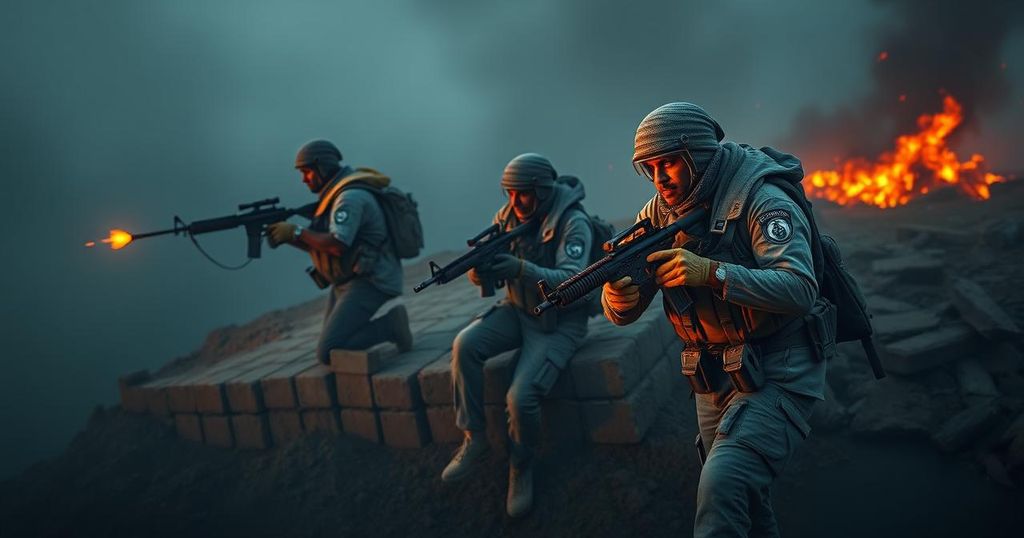Escalation of Attacks: Iran-Led Militias Intensify Hostilities Against Israel
Iran-linked militias in Iraq have escalated attacks on Israel, launching about 40 operations in a short span, reflecting a broader proxy conflict as Iran seeks to support its weakened allies like Hezbollah amidst a volatile regional landscape. As Israel responds with increased military strikes, the overall dynamics illustrate the complex nature of Middle Eastern geopolitics and the shifting roles of various militant factions.
In recent weeks, Iran-linked militias in Iraq have intensified their operations against Israel, conducting approximately 40 attacks utilizing missiles, drones, and rockets over the past two and a half weeks. This surge in hostility coincides with the broader escalation of regional tensions following the assassination of Hezbollah’s leader, Hassan Nasrallah, by an Israeli airstrike on September 27. Since the initiation of warfare in Gaza last year, Iran has increasingly leveraged its various proxies across the Middle East, particularly as Hamas suffers from significant losses. Analysts note that the current active militias in Iraq, while less capable than Hezbollah, are attempting to prove themselves by aligning their efforts with the larger agenda of Iran’s axis of resistance against Israel. The rapid increase in missile activity from Iraq underscores Iran’s ongoing strategy to use these militias as a means of both support and competition within its network. Notably, Iran’s proxy forces in Syria and Yemen are also potential targets for Israeli retaliation. Israel has escalated airstrikes targeting Iranian-affiliated strongholds in Syria, particularly after a recent surge of missile threats, including a mass launch of 180 ballistic missiles one day prior. The ongoing conflict has not gone unnoticed; incidents such as a suspected Israeli sabotage that affected Hezbollah’s communications equipment have highlighted the tangled relationships among Iran’s proxies. Israel’s tailored military responses, including strikes on key Iranian positions in Syria, signal a concerted effort to disrupt the operational capabilities of these groups while maintaining significant focus on the evolving dynamics within Iraq. Israel’s responses have increasingly broadened to include military actions against groups linked to the Islamic Resistance of Iraq (IRI), which has claimed responsibility for various attacks against Israeli and US targets. Coupled with growing collaborations among the militias, including those of the Houthi faction, the operational landscape remains highly volatile. Furthermore, direct Israeli strikes in Yemen against facilities linked to the Houthis demonstrate Israel’s heightened level of engagement in this proxy conflict. As the overarching situation unfolds, many remain unaware of the complexities and layered nature of conflicts involving Iraq and Syria, epitomizing how significant tensions can manifest in less visible arenas, as described by analysts observing this evolving situation.
The article discusses the increasing aggressiveness of Iran-linked militias in Iraq towards Israel, particularly in the context of heightened regional tensions following significant Israeli actions against Iranian and Hezbollah leadership. Following the outbreak of the Gaza war and subsequent assassination of Hezbollah’s leader, the dynamics have shifted to utilize less prominent factions within Iran’s network of militant groups. This has resulted in a pattern of missile attacks from Iraq while Israel develops strategies to counter these threats, including airstrikes against militia positions in Syria and escalating military operations in areas associated with Iran’s influence across the Middle East.
In summary, the article presents a concerning escalation of attacks by Iran-affiliated militias in Iraq against Israel, marking an intensifying proxy conflict amidst a backdrop of shifting battles within the region. The fallout from Israel’s actions against key figures in Hezbollah and broader Iranian associates has mobilized less prominent factions to engage violently. With Israel ramping up its military operations in response, the intricate web of alliances and animosities in the region continues to evolve, indicating that the situation remains precarious and unpredictable.
Original Source: www.theguardian.com




Post Comment